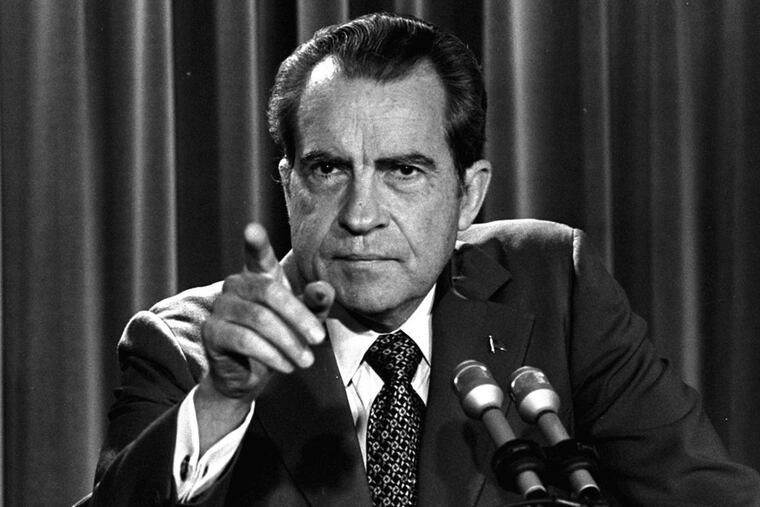From Watergate to now, a shortage of courage from Republicans | Opinion
Might Makes Right has become the defining principle of the GOP: Whatever helps us our team is good, and we'll sacrifice anything - even the good name of our highest institutions - to win the game.

In the spring of 1974, a group called Americans for the Presidency circulated a memo in defense of embattled President Richard Nixon. Urging voters to telephone members of the Senate Judiciary Committee, the memo warned that congressional lawmakers investigating the Watergate scandal had been "swept up by the lynch-mob atmosphere" of the "Nixon-hating media."
But Americans for the Presidency didn't exist, except on letterhead. It was a phony grass-roots organization cooked up by the national director of the College Republicans, a 23-year-old George Mason student named Karl Rove.
Rove would go on to become George W. Bush's political muse, helping Bush capture the White House in 2000 and win reelection in 2004. But his lasting legacy is the win-at-any-cost style of GOP politics, which puts the interests of the Republican Party over the health, dignity, and legitimacy of our national institutions.
That's the only way to understand recent Republican attacks on the Federal Bureau of Investigation and on special prosecutor Robert J. Mueller, who is probing the Trump administration's connections to Russia. President Trump has led the way, claiming the FBI is "in tatters" and denouncing the Mueller investigation as a "Democratic hoax."
Congressional Republicans have demanded a second special prosecutor to investigate Mueller's alleged misdeeds, including his supposedly illegal acquisition of Trump transition-team emails. And on Fox News, especially, GOP media mouthpieces have labeled the Mueller probe a witch hunt and — most alarmingly — a coup d'etat.
Such maneuvers have triggered nostalgia in Democratic precincts for the courageous Republican patriots of the Watergate era, who it is said broke with Nixon to protect American democracy and the rule of law. But that narrative overstates the bravery of GOP leaders, many of whom stood solidly behind Nixon until his last few days in office.
Echoing Rove, California Gov. Ronald Reagan blasted the "lynch mob" calling for Nixon's resignation. So did Arizona Sen. Barry Goldwater, the 1964 GOP presidential nominee who brushed off early reports about the plot to wiretap Democratic operatives at the Watergate. "Well, for Christ's sake, everybody bugs everybody else," Goldwater said, noting that Lyndon Johnson and John F. Kennedy — Nixon's two immediate predecessors — had wiretapped people without their knowledge.
Only when the "smoking gun" tape surfaced, confirming Nixon's role in the cover-up, would Goldwater change his tune. On Aug. 7, 1974, he visited the White House with two other GOP leaders to tell Nixon that only 10 senators — at most — would continue to support him. Two days later, Nixon resigned.
But Goldwater's "everybody does it" defense had legs. It originated with Nixon himself, who alternated between denying any wrongdoing and insisting that other politicians did the same wrong things. During a 1973 news conference, he told reporters that Kennedy and Johnson authorized wiretaps but "there was no talk of impeachment." The Watergate scandal was simply an attempt to undo his resounding reelection victory in 1972, Nixon said, when he carried every state except Massachusetts.
Republican media outlets picked up on the same theme, warning that "Democratic elites" were using a "double standard" to unseat Nixon. And in June 1974, the everybody-does-it defense would be immortalized by the Southern-rock band Lynyrd Skynyrd in "Sweet Home Alabama," which climbed to No. 8 on the charts. "Now Watergate does not bother me/ Does your conscience bother you?" the band asked, in the song's most famous couplet.
You can hear the same refrain in every Republican defense of the Trump administration, starting with the president himself: We didn't do it, and the Democrats do it as well. Witness Trump's consistent attacks on the FBI's investigation of the Russian connection, coupled with his claims that the agency allegedly gave Hillary Clinton a free pass on her email server. Channeling his inner Nixon, Trump has also insisted that the whole controversy is just a plot to reverse the last election.
But few prominent Republicans have stepped up to defend the FBI or Mueller, a person of impeccable integrity and credentials. Perhaps that's because no smoking gun has yet surfaced to tie Trump to Russia. More likely, though, it's because Might Makes Right has become the defining principle of the GOP: Whatever helps our team is good, and we'll sacrifice anything — even the good name of our highest institutions — to win the game.
Let's be clear: There really were courageous Republicans during the Watergate years. Leaders like Howard Baker — who famously asked what did Nixon know, and when did he know it — put the interests of their country first. But they were few and far between, and now they seem to be gone. And so does the soul of the Republican Party.
Jonathan Zimmerman teaches education and history at the University of Pennsylvania. He is the author (with Emily Robertson) of "The Case for Contention: Teaching Controversial Issues in American Schools" (University of Chicago Press). jlzimm@aol.com